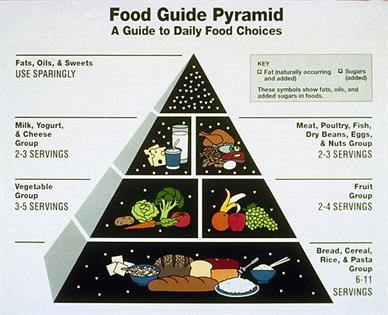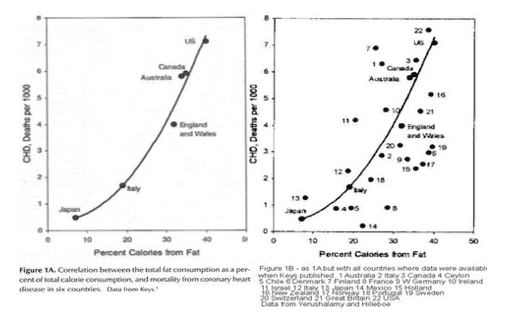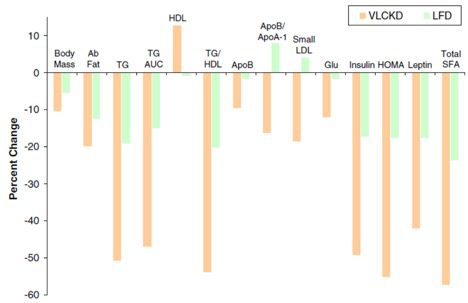The Real Truth About Fats

On the global scale, we have failed to promote accurate dietary guidelines for improving our health. We can’t necessarily be blamed for initially thinking fat would make us fat – it is called fat, after all. However, after 40-50 years of climbing death rates and incidence of lifestyle diseases, we absolutely must be more critical of our ways. More people are adhering to the low-fat recommendations, but more people are succumbing to sickness and death. The basis for a high-carbohydrate lifestyle is due more to agri-business pushing their products than it is due to good science. Our health should be based on causation, not imaginary correlations. Let’s dive into the real truth about fats.
Dissecting the Disconnect
Dietary recommendations, in some form or another, have been commonplace in the United States for the better part of 100 years. Early on, the recommendations were actually to eat more to prevent deficiency diseases and general malnutrition. The recommended foods (meat, eggs, and dairy) were in complete contrast to those of our current system.
Graphics from the 1940s and 1950s said to eat plenty of “The Basic 7,” which consisted of:
1. green and yellow vegetables
2. oranges, tomatoes, grapefruits, and salad greens
3. other (starchy) vegetables and fruit
4. dairy
5. meat, fish, eggs, nuts, and beans
6. bread and cereal products, and
7. butter.
Oh yeah, and “eat any other food you want.” There were no upper limits, and butter was its own required category (heck yes!).

From 1950’s – 1992, the “eat to your heart’s content” motto remained in place with only a small change, reducing from 7 to 4 categories:
1. fruit and vegetable
2. dairy
3. meat
4. bread and cereal
For each category, it was recommended to eat a number of servings “or more” each day. In essence, each of these maintained a recommendation to eat plenty of protein, fats, and carbohydrates in relatively equal quantities.
Of course in 1992, the food guide pyramid came about. The Food Guide Pyramid was a complete disaster.

Through 12 years of back and forth between the USDA and food interest groups, we were finally limited in our overall food consumption (which the food industry did not want). Originally, fruits and vegetables were intended to form the base of the pyramid, but the grain industry would not make enough money that way, and they managed to get that changed. It’s too bad that the meat, dairy, and egg boards did not have as much power for reasons that we will discuss.
Realizing the error of their ways, the USDA reduced the recommendation for grains and incorporated exercise into the MyPyramid guide of 2005 until 2011, when MyPlate basically said the same thing, but it also demonstrated how to arrange food on a plate.
It is interesting to note that the Food Guide Pyramid began its formation in 1980, and this is the exact time we began to reach an unprecedented trajectory for increasing rates of obesity, diabetes, heart disease, and other preventable diseases. Although the infographic was not yet released, the messages it contained were still beginning to be broadcast throughout the US.
Effects of the (Mis)guidance
Could it be that the messages of the Food Guide Pyramid and its revisions actually fueled the obesity epidemic?
In fact, yes.
In the 1970’s, Dr. Ancel Keyes published the infamous Seven Countries Study, which indicted dietary fat as the “cause” of death. Interestingly enough, data for 15 other countries were excluded from his analyses. Not for any valid reason, but because they did not fit his hypotheses. This is about as unethical a “scientist” can possibly be. The 7 countries selected by Keyes did actually correlate dietary fat to mortality. However if we include all available data (the right way to conduct science), there is no relationship. Similarly, the Framingham Heart Study preceded the Seven Countries Study and also “adjusted” the conclusions of the study so that they did not reflect the truth.
Figure 1A shows what Dr. Keyes reported. Figure 1B shows what data was available. Look between #7 and #14. Finland and Mexico ate about the same amount of fat (~23%; a healthy amount by USDA standards), yet the two points are nearly as far away as can be. If there was a correlation, all points would be near the line. Clearly, there is no correlation here.

The truth is, there is not, and there never was, a correlation between fat intake and heart disease, death, or any other major preventable disease.
Dr. John Yudkin rejected the fat-theory of disease at the time of its promotion. In any case, even if the information presented in these two “landmark” studies were true, they were correlational studies and are, therefore, incapable of determining causation. For example, the per capita consumption of mozzarella cheese is over 95% correlated with doctoral degrees awarded in civil engineering over time. Did mozzarella cheese cause an increase in the earning of PhDs in civil engineering? We could make such an argument, but it’s pretty unlikely. To make a true determination, a scientist would need to give mozzarella cheese to students studying civil engineering and measure graduation rates compared to a homogenous group given a placebo cheese. Given that the two are correlated, such an investigation would be justified. That is the exact purpose of correlational research – to direct causative research, not instruct a nation on what should be considered good practice. If this were to occur in the pharmaceutical industry, heads would roll (possibly literally) with such little validation for the putative therapeutic recommendation.
Since the publication of these two studies, numerous other pieces of research, both causative and correlational, have indicated that dietary fat and saturated fat pose no risk to heart disease, obesity, diabetes, or any other common disease. The data actually suggest that high-fat diets are superior to low-fat diets. High-fat diets improve cholesterol, triglycerides, insulin, glucose, body weight, body fat, waist circumference, and several other markers when compared head-to-head with low-fat diets. THIS is the truth, and to believe anything else is a detriment to the advancement of our species.

The truth extends to indicate that not only were we mistaken about fats, but carbohydrates are more likely the cause of our worldwide plight.
In a review, Volek and Feinman boldly postulate within the title of their paper that “Metabolic Syndrome may be defined by the response to carbohydrate restriction,” with metabolic syndrome being cardiovascular disease & diabetes simultaneously. Basically, they’re stating that metabolic syndrome will undoubtedly be improved if dietary carbohydrate intake is reduced. It has been shown that even modest reduction of carbohydrate intake by 15% produces a dramatic reduction in several risk factors, such as insulin and triglycerides. Moreover, replacing dietary fat with carbohydrate has a negative impact on cholesterol ratio two-fold greater than isocaloric amounts of butter and four-fold greater than isocaloric amounts of palm-oil, while coconut fat, mayonnaise, and rapeseed oil improved markers of heart health, suggesting carbohydrate is far worse for human health than any fat.
Figure from Volek et al. (2008) comparing the health effects of a very-low carbohydrate, ketogenic diet (VLCKD) and a low-fat diet (LFD).

The latest research goes on to implicate low-carb, high-fat diets for beneficially affecting more than obesity and diabetes. Specifically, this dietary intervention has the potential to help those with cancer, cardiovascular diseases, diabetic neuropathies, Alzheimer’s disease, multiple sclerosis, autism, epilepsy, polycystic ovarian syndrome, Parkinson’s disease, ischemic brain injury, depression, headaches and migraines, narcolepsy, McArdle disease, cardiac ischemia, amyotrophic lateral sclerosis (ALS; Lou Gehrig’s disease), enzyme-deficient metabolic disorders, acne, infantile spasm syndrome, attention-deficit disorder, bipolar disorder, schizophrenia, infertility, chronic pain, psoriasis, respiratory deficiencies, oxygen hypertoxicity, mitochondrial myopathy, fatty liver disease, and stroke.
Several of these diseases are positively impacted by ketones. Ketones are generated when individuals restrict carbohydrate and increase fat consumption to a point where they become ketogenic (i.e. the ketogenic diet). Many people inappropriately associate ketones with diabetic ketoacidosis, but this is a byproduct of failing organs, and it is impossible to reach ketoacidosis levels of ketones through dieting (or even by extended fasts) in healthy individuals. Research in this area is relatively novel, but already there are clear implications for the ketone bodies themselves, irrespective of diet alone, in diabetes, cancer, neurodegenerative disorders, myopathies, free radical toxicity, muscle wasting, hypoglycemic episodes, and certain genetic enzyme deficiencies.
In sum, excessive and consistent carbohydrate intake prevent the adaptation to effectively metabolize dietary fat. Dietary fat does not prevent adaptation to effectively metabolize carbohydrate, and the body can switch back with relative ease. Therefore, it is the carbohydrate content of the diet which produces illness, possibly in part due to the suppression of ketone bodies. Human diets should be based primarily on fat and protein to prevent maladaptation to a carbohydrate-dependent metabolism leading them down a road to illness and malaise.
All Fats Are Healthy.
Final Statements
The low-carbohydrate, high-fat lifestyle might seem counter-intuitive, but it was common treatment for diabetes prior to 1970 and the invention of injectable insulin. Surely if a high-fat diet was unhealthy, it would negatively impact performance, but athletes assuming such a diet seem to be winning more and more victories as the diet takes root. The evidence overwhelmingly confirms that low-carb, high-fat is the road to optimal health and performance – we only need to overcome our pride, admit to our wrongdoing, and stop this crisis before it becomes the undoing of our species. Food products designed to have minimal impact on blood sugars with high fat and/or protein content are growing in popularity, and they will undoubtedly help in correcting our societies’ health.
This is the second article in a three-part series about fat, brought to you by Compound Solutions.
Part 1 – What are Fats? A Scientific Approach to Dispelling Confusion Around Fat
Part 2 – The Truth About Fat
Part 3 – Fat as Fuel in Sports Performance
Click here for a complete list of references supporting this 3-part fat series.





